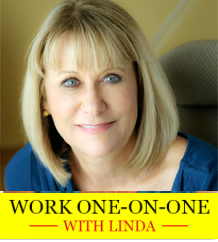As I tackle this week’s newsletter, I find myself feeling tired and swamped. When I consider how many things are happening in my life right now, I am not surprised.
I have passed the three hundred page mark in my novel, as well as creating over forty newsletters to connect with you all over the last six months; I am now readying Bespotted for an October paperback publication; and I am revamping my website.
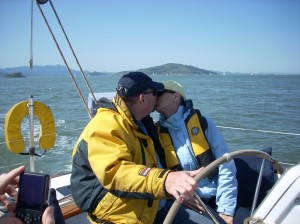
I have been serving as my mother’s literary executor for the past forty-one years and handling the myriad issues that surround the life of her poetry; I am preparing for my son’s wedding and planning our extended trip to Israel; I am sailing the San Francisco Bay every other weekend with my husband as a way of infusing my marriage with love and affection; I am participating in dog shows on alternate Saturdays and Sundays, as well as giving all three of my spotties plenty of attention and warmth; I am putting effort into my friendships; I am attempting to remain present and joyful within the boundaries and freedoms of sisterhood; and, last but not least, I am keeping my relationships with my two grown sons vital and flourishing. What a plateful!
All of this activity requires me to play a variety of roles: Linda, the writer; Linda, the published author; Linda, the literary executor; Linda, the travel agent; Linda, the sailor; Linda, the dog and dog show lover; Linda the wife, mother, daughter, sister and friend.
Of course, such a bountiful array occurs in everyone’s life in one form or another. I am sure all of you could make such a list. I am no different than anyone else. Many of us deal with all of these many responsibilities with aplomb, grace and efficiency. Many others do it with a sense of panic at being overwhelmed. Day to day, I discover myself caught between these two extremes.
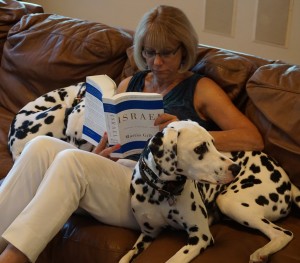
Some mornings I wake with the conviction that I will never be able to manage everything, and just want to burrow into the bed sheets, surrounded by the comforting buffer of my black and white tribe. Other mornings I bounce up, brush my teeth, set the dogs loose in the backyard and sit down at my desk to write. Whichever way I handle it all, I do achieve most of it, regardless of how uncertain I may initially be. We all have far more flexibility and strength than we often give ourselves credit for.
During those times when my life has been too complicated, or too hard to handle, I’ve discovered that the best I can do for myself is to help someone else. I first learned the concept of such outreach when I volunteered at a soup kitchen, and also ran a program at our temple that brought daily meals to those dying of AIDS. In later years, I “adopted” from afar a two-year-old girl in Africa, through an organization that helped provide her with food, education and improved living conditions such as indoor toilets and a local grammar school. I exchanged translated letters with her and her family for many years, until she moved out of the program when she turned eighteen. Now Brad and I sponsor another two-year-old, this time a little girl from South America.
Recently, I took on a lesser task, but one no less important to me: for over two years, I have been mentoring a young woman who had bought a show puppy from me, though she had no experience in the ring. With her as his handler, Mac’s brother George, (whom I had bred and still co-own), was striving to finish his championship. Several weekends ago, the two of them achieved this goal. As I stood clapping at ringside, I was pleased for myself, but far happier for her. Despite my support, it was ultimately her hard work that made this success wholly her own.
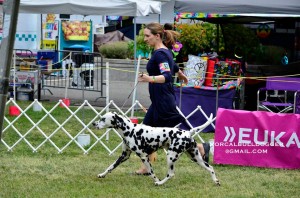
Last week, an event along the same lines occurred in my life, and is worthy of similar note: a podcast arrived in my e-mail inbox. It was a recording of my mother’s last public reading of her poetry, given at Goucher College just two days before her suicide in 1974. In 2012, I had been approached by a respected professor of her poetry, who proposed that we obtain the audiotape of the reading and give Anne Sexton another performance, this time a posthumous one.
Over the next three years, I took time out from life’s hectic pace to make certain that someone I loved would have continuing success, despite her death, in an aspect of her life which was critically important to her. My mother’s poetry had made her feel fulfilled in a unique way; I had a commitment–as her literary executor and as her daughter–to support her work, because I had experienced one of my most exceptional relationships with her.
Spurred on by love, as well as faith in each and every poem, I wanted fans and scholars alike to hear her voice one more time. After laboring with determination for several years, the professor and I at last brought the project to fruition. Two weeks ago, though I was not present, the recorded reading was played to an enthusiastic audience.
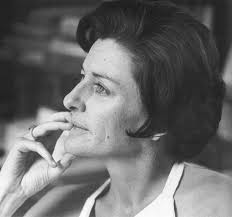
And so I clicked on the podcast with anticipation, eager to hear my mother at the height of her powers. But, as I listened, unexpected emotions overcame me. She had returned to me in a very visceral sense, and it was haunting to hear her poems, spoken once again some forty years after her death. I had spent a great deal of my life working to honor and remember her, and then to put her suicide to rest in both my mind and heart. The familiar sound of her voice brought back so many memories. I began to cry. I shut down my computer and her voice died away. The ensuing silence came as a relief.
I sat there at my desk without moving, feeling as if I had failed her in some essential way. How many people would treasure the opportunity to hear, even once more, the sound of a loved one’s voice after death? What had been the point, from my point of view, in pushing this project forward if I couldn’t even listen to it? Eventually, I got up and cuddled on the couch with Breeze, Cody and Mac.
After a while, I thought to myself that I was forgetting the most and perhaps only important thing: I had been instrumental in bringing Anne Sexton back to her public in a significant manner. I had accomplished a great deal for her.
I knew my mother would have been very moved by the support I had offered in my role as her literary executor throughout the years–which was and continues to be very taxing emotionally, as well a sacrifice of valuable time. In the forty-one years since her death when I was twenty-one, I have ensured that her work would continue to be read and heard. I realize, gratefully, that this effort brought me maturity, both as a writer and a woman.
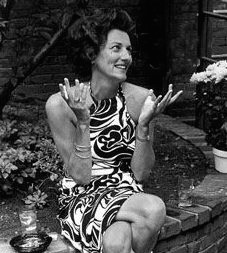
Who was more precious to me in so many ways than she? Aren’t our mothers the ones we most want to help as they grow older–whether it be taking them into our homes when they cannot manage by themselves any longer, or be it making certain they have the best nursing facilities we can afford? Just as they brought us into this world, we now see them out.
And so, on that day last week when I sat with the dogs on the couch, feeling like a failure, I at last recognized something I already knew: the gift of helping those whom we may or may not know, with our attention or our love or our time, moves us far beyond the small world we call our own. As the poet Maya Angelou said: “When you get, give. When you learn, teach.”
This offering from the heart is what keeps us human, compassionate, and yes, even wise. Grabbing every such opportunity brings with it the magic of caring for ourselves as well. And that is a potent magic, indeed.
Yours,
Linda
Have a comment or feedback? Talk to Linda!

